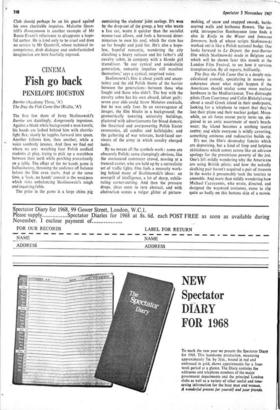CINEMA
Fish go back
PENELOPE HOUSTON
Barrier (Academy Three, 'A') The Day the Fish Came Out (Rialto, 'A') The first few shots of Jerzy Skolimowski's Barrier are dazzlingly, dangerously ingenious. Against a blank white background a man kneels; his hands are lashed behind him with electric- light flex; slowly he topples forward into space. Another follows him, then another, while a voice sombrely intones. And then we find out where we are: watching four Polish medical students at play, trying to pick up a matchbox between their teeth while perching precariously on a table. The effect of the no hands game is hallucinatory, throwing the audience off balance before the film even starts. And at the same time, a 'look, no hands' conceit is the weakness which risks unbalancing Skolimowski's tough and inquiring fable.
The prize in the game is a large china pig
containing the students' joint savings. It's won by the drop-out of the group, a boy who wants a fast car, wants it quicker than the socialist mouse-race allows, and feels a harassed deter- mination to own his soul, which the state has so far bought and paid for. He's also a hope- less, hopeful romantic, wandering the city clutching a heavy suitcase and his father's old cavalry sabre, in company with a blonde girl tramdriver. 'In our cynical and unidealistic generation, romantic impulses still manifest themselves,' says a cynical, surprised voice.
Skolimowski's film is about youth and uncer- tainty and the old Polish theme of the barrier between the generations—between those who fought and those who didn't. The boy with the cavalry sabre has his own absurd, infant guilt: seven year olds could throw Molotov cocktails, but he was only four. In an extravagance of images, the film blocks in a background; the geometrically towering university buildings, plastered with advertisements for blood donors; the theatrical and overpowering Polish Easter ceremonies, all candles and hallelujahs; and the gathering of war veterans, hard-faced sur- vivors of the army in which cavalry charged tanks.
By no means all the symbols work : some are obscurely Polish; some clumpingly obvious, like the overcoated commuter crowd, moving at a tranced canter, who are held up by a surrealistic set of traffic lights. One feels a necessity work- ing behind many of Skolimowski's ideas: an overspill of intelligence, a lot of sharp, exhila- rating corner-cutting. And then the pressure drops, ideas seem to turn abstract, and with abstraction comes a vulgar glitter of picture- making, of snow and snapped swords, battle- scarred walls and hothouse flowers. The ice- cold, introspective flamboyance (one finds it also in Knife in the Water and Innocent Sorcerers, both of whose scripts Skolimowski worked on) is like a Polish national badge. One looks forward to Le Depart, the post-Barrier film which Skolimowski made in Belgium and which will be shown later this month at the London Film Festival, to see how it survives transplantation. By all reports, brilliantly.
The Day the Fish Came Out is a deeply mis- calculated comedy, speculating in moony in- coherence about what might happen if the Americans should mislay some more nuclear hardware in the Mediterranean. Two distraught pilots (Tom Courtenay and Colin Blakely) creep about a small Greek island in their underpants, looking for a telephone to report that they've lost their plane and their nuclear gadget. Mean- while, an air force rescue party turns up, dis- guised in an antic assortment of men's beach- wear; the island becomes a seething tourist centre; and while everyone is wildly cavorting, something ominous and radioactive builds up.
It's not the film's doomsday fancies which are depressing, but a kind of limp and helpless skittishness which comes across like an advance apology for the pretentious poverty of the jest. One's left mildly wondering why the Americans are using British pilots; and how the nakedly skulking pair haven't acquired a pair of trousers in the weeks it presumably took the tourists to assemble. And more than mildly wondering how Michael Cacoyannis, who wrote, directed, and designed the wayward costumes, came to slip quite so badly on this banana skin of a movie.










































 Previous page
Previous page